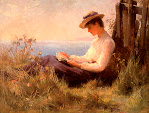Before we went and saw the play, I attended a seminar on it. Ace Pilkington was again the moderator. I didn’t ask any questions, as is my wont, but went to listen and be enlightened or enraged, as the case may be. During the discussion, Prof. Pilkington mentioned that he didn't like Trevor Nunn's film. He thought Imogen Stubbs looked too much like a boy, and the point was that Viola wasn't supposed to look like a boy – she was supposed to look like a girl disguised as a boy. But if that were the case, I said to myself, wouldn’t everyone who takes her for a boy look really really stoopid for not seeing through her disguise?
He also didn't like the cuts or vocabulary changes made in the film, or the addition of the shipwreck at the beginning. He thought the Festival's production was much better. I was going to defend the film and ask him if he'd read Nunn's published screenplay, in which the cuts and changes are explained, but I was too shy. However, I formulated some very good arguments in my mind and feel confident that I would've won the debate.
Anyway, I had the highest hopes for this production, and therefore I was the most disappointed with it of the three I saw. The sets and costumes were very nice, as usual. The acting was pretty much good all around – my favorite, Gary Armagnac, played Sir Toby and he did very well. He wasn't as completely bitter as his character was in the film or in Kenneth Branagh's tv version. I know the current thing is to bring out the dark side in Shakespeare's comedies, but I like the comedies to still be comedies. This Sir Toby was drunken and opportunistic, and the audience was uncomfortable about his treatment of Maria, but in the end he did the right thing by her, and his final rejection of Sir Andrew sort of fizzled out as he realized that he himself was just as much an idiot, so they went off to be "dressed" together.
Sir Andrew was a bumbling, clumsy fool, much funnier and more likeable than this production's Feste. But I have a soft spot in my heart for Sir Andrew's character. I usually find him to be one of the funniest characters (in a bittersweet way) in the play, and this time was no exception. His duel with Viola was absolutely the most hilarious of any of the ten productions of Twelfth Night I've seen.
The actor who played Malvolio got him just right, I think – not too serious, not too silly. Well, as you know, I have pretty definite ideas of how things should be, and my idea of Malvolio is that he's not to be taken too seriously, that his imprisonment and ordeal shouldn't be too horrible, so that the audience should feel sorry for him in his predicament at the end, but only until he says he'll be revenged on everyone. I conclude from this that he's more of a fool than anyone else in the play and hasn't learned a thing about himself, so he, as a character, doesn't merit our continued sympathy. I also believe he shouldn't win over the audience by being so funny that people enjoy his scenes over all others (which I've seen done, too). Anyway, this Malvolio was not too tragic, not too comic.
So I'd have to say this play belonged to the "secondary" characters. The main characters (with the exception of Olivia, who was passable for the most part) were all disappointing. Feste was way too jolly and so lost all his distinctiveness. Orsino's characterization was one of the blandest I've ever seen. It doesn't help that he disappears during the whole middle of the play, but this time I hardly missed him. And the gal playing Viola basically repeated her performance as Marina in Pericles, i.e. Shakespearean heroine as sitcom bimbo. (Except for the duel, but she didn't have to say anything during that.)
One particular moment I found disappointing was at the end: when Orsino discovers that Cesario is really Viola, he says she will now be her master's mistress and he's about to embrace her but sort of pushes her away on his line "Let me see thee in thy woman's weeds", as if he's reluctant to show affection to a man. This got a laugh from most of the audience, but not me. I thought it was important to show Orsino overcoming his Romeo-like silliness about love, but it turned out to be posturing the whole way through. (In fact, in the very first scene, when Orsino said, "If music be the food of love" I almost groaned at the actor's declamatory style of delivery. It was my first hint that things were not going to go as I had hoped they would.)
Well, anyhow, there were quite a few children in the audience, and they appeared to like Sir Toby and Sir Andrew and Malvolio and Fabian and Maria as much as I did. But, as she had done after the USF production of Hamlet, Megan again echoed my sentiments when she said that, although she liked the play, she enjoyed the movie more.




1 comment:
this happens to be my favorite shakespeare play. although i don't remember this one much at all (or at all) i do really, really like the film. i think it's very artistically executed in many ways.
i DO remember the one we saw at the globe in san diego a few years ago, and i remember liking that one a lot, esp. when andrew fell in the stream, but i've always felt sorry for sir andrew, even if he is the biggest dummy of them all. (well, besides malvolio)
Post a Comment